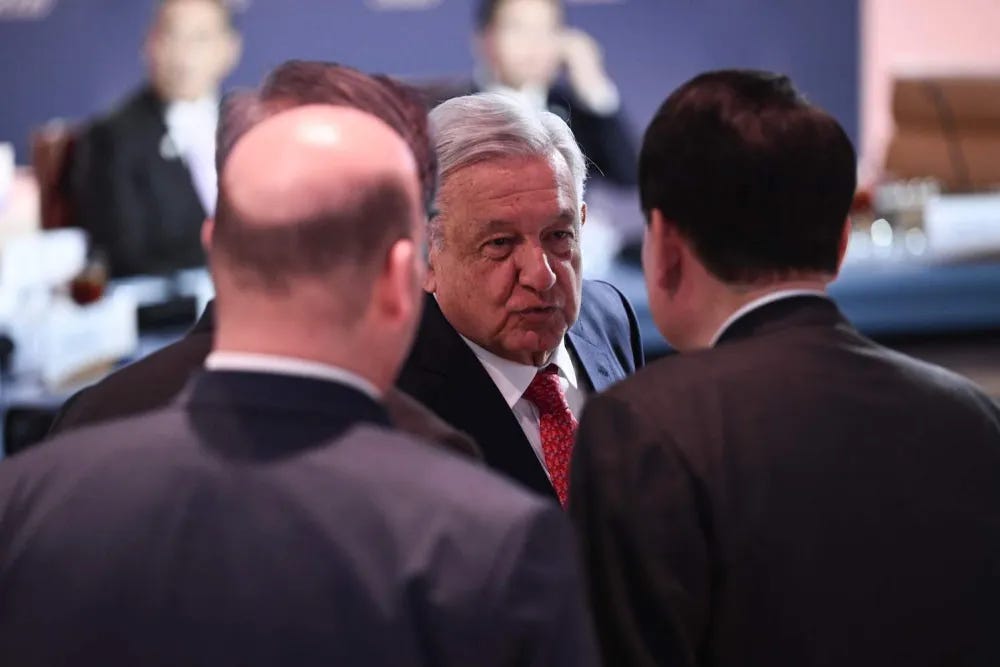Fentanyl Diplomacy: Navigating the Deadly Trade in U.S.-China-Mexico Relations
López Obrador's International Visit Spotlights Anti-Fentanyl Efforts Amid Complex Bilateral Dynamics.

I. López Obrador's International Mission: APEC Forum and Bilateral Meetings
Mexican President Andrés Manuel López Obrador embarked on a significant international trip to San Francisco for the Asia-Pacific Economic Cooperation (APEC) forum. Amidst meetings with counterparts from China, Japan, and Canada, his bilateral encounter with U.S. President Joe Biden drew attention. However, it was López Obrador's historic meeting with Chinese President Xi Jinping that held particular significance, not only for economic ties but also for discussions on addressing the fentanyl trade—a contentious issue impacting relations with the United States.
II. Fentanyl Trade: A Growing Global Menace
The fentanyl trade, a global menace originating in drug labs primarily in Mexico, poses a severe threat to public health, especially in the United States. Despite global efforts to restrict the sale and shipping of fentanyl and its precursor chemicals, the illicit drug continues to wreak havoc. Fentanyl overdoses claimed over 70,000 American lives last year, prompting heightened scrutiny and collaborative efforts to address this burgeoning crisis.
III. Fentanyl's Complex Supply Chain: China to Mexico to the United States
A significant challenge in combating the fentanyl trade lies in its complex supply chain. China, with its massive pharmaceutical sector, serves as a source of precursor chemicals that are then shipped to drug labs in Mexico. These labs produce the potent drug, which is then trafficked northward into the United States. However, strained relationships between the United States, China, and Mexico have hindered effective anti-narcotics cooperation, contributing to the persistence of the fentanyl crisis.
IV. Recent Diplomatic Developments: Thawing Relations and Anti-Narcotics Cooperation
Recent diplomatic efforts, particularly by the Biden administration, seek to thaw relations with China and address the fentanyl crisis. The meeting between Biden and Xi included a commitment to resume anti-narcotics cooperation, with China pledging law enforcement action against illegal precursor suppliers. López Obrador's discussions with Xi further emphasized anti-drug cooperation and the combatting of precursor chemicals trafficking—a potential avenue for collaboration in a historically complex landscape.

V. López Obrador's Stance on Fentanyl: Challenges to Meaningful Cooperation
Despite diplomatic gestures, López Obrador's track record on fentanyl presents challenges to envisioning meaningful cooperation. His drug policy stances, characterized as "regressive" and prioritizing moral judgments over public health, raise concerns among observers. Actions such as defunding a national survey on drug and alcohol use and closing a lab supporting opioid addiction treatment underscore potential hurdles in fostering effective collaboration.
VI. Global Consensus vs. López Obrador's Approach: A Clash in Perspectives
The clash between López Obrador's approach and the global consensus on addressing the opioid crisis is evident. Experts advocate for harm reduction techniques, including medications to mitigate overdoses, recognizing the challenges of fully eliminating fentanyl from international trade flows. While targeting precursors remains crucial, López Obrador's approach raises questions about aligning with effective strategies endorsed by experts.
VII. Mexico's Incremental Steps: UN Program Participation and Information Sharing
Recent initiatives by Mexico, such as joining a United Nations program facilitating information-sharing on suspected illicit goods in shipping containers, indicate incremental steps to address the fentanyl supply chain. However, experts argue that more substantive information exchange is needed to make a meaningful impact. López Obrador's talks with Xi underscore evolving efforts, yet the effectiveness of these measures remains to be seen.
VIII. Broader Policy Rethink: U.S. Relations with Mexico in Light of Anti-Crime Cooperation
The broader context of strained anti-crime cooperation between the United States and Mexico prompts a call for a policy rethink. The Biden administration, reliant on Mexico to manage northward migration, has faced challenges in securing robust cooperation. Experts advocate for a more assertive approach, urging a reconsideration of the current U.S. stance towards Mexico City.
IX. Future Prospects: Mexico's Presidential Election and Potential Policy Shifts
With Mexico set to elect a new president next year, there is a potential for policy shifts in drug-related matters and bilateral relations with the United States. However, the likelihood of significant changes remains uncertain, especially with front-runner Claudia Sheinbaum's dependence on López Obrador's patronage, indicating a potential continuation of current policies.
X. Closing Remarks: Balancing Diplomacy and Public Health
As the fentanyl diplomacy unfolds, the delicate balance between diplomatic relations, drug policy, and public health considerations comes to the forefront. Navigating this intricate landscape requires nuanced strategies, cooperation, and a reevaluation of approaches to effectively address the multifaceted challenges posed by the fentanyl trade.




